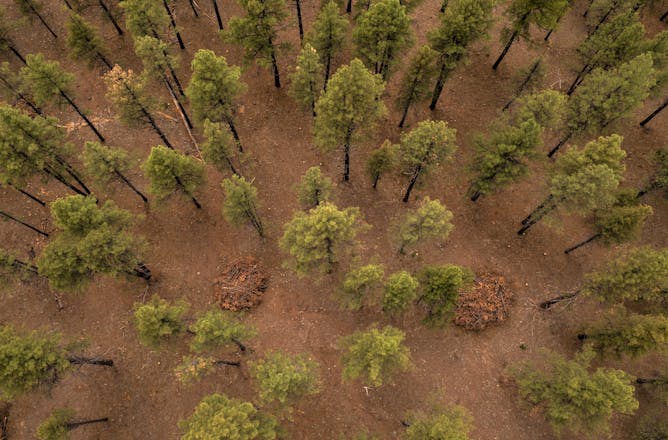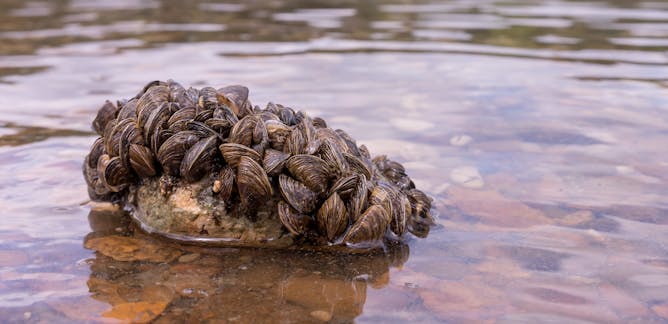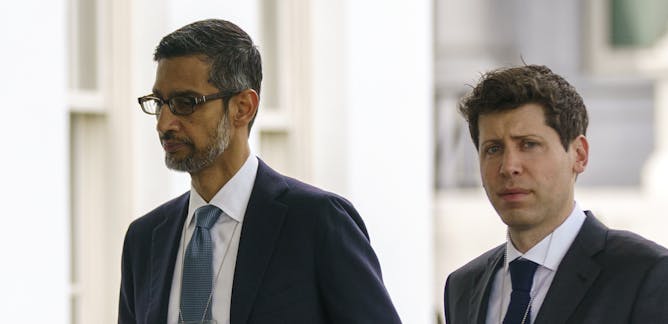|
|
|
|
There’s no question that we’re entering what some would call a golden age of space exploration – witness India’s recent landing on the south pole of the Moon and so many more ventures beyond the confines of our planet. But in this Wild West environment, there’s one problem that’s not being dealt with sufficiently: trash. University of Arizona astronomer and regular contributor Chris Impey writes that geopolitical rivalries and commercial interests continue to
override the problems – and dangers – caused by space debris and waste, including 100 bags of human waste now on the Moon.
Even a casual student of psychology knows that certain parts of the brain are wired to detect danger, an adaptation that was valuable in our species’ early evolution – and still is in reacting to threats – but that can be counter-productive in modern life. Wayne State University psychiatrist and neuroscientist Arash Javanbakht explains how fear functions in people, starting in the “fight, flight or freeze” parts of the brain and extending to different parts of the
body. Although we all may feel anxiety and fear in different ways, ultimately emotions originate in the brain, the control center of our physical sensations.
Having read so many of our articles on wildfires, it’s hard for me to look at a dense forested area and not wonder whether it’s in danger of a severe burn because of the build-up of so much “fuel.” Writing about her just-published study, University of Montana fire ecologist Jamie Peeler explains the analysis she and her colleagues did to identify areas in the western U.S. that offer the best payoff from forest thinning efforts, in terms of reducing wildfire risk
for communities and carbon emissions. “Forest thinning is like weeding a garden: It removes brush and small trees in dry conifer forests to leave behind space for the larger, older trees to
continue growing,” she writes.
Also in this week’s science news:
If there’s a subject you’d like our team of science editors to investigate, please reply to this email.
|

|
Martin LaMonica
Director of Editorial Projects and Newsletters
|
|

An artist’s rendering of debris floating through Earth’s orbit.
Petrovich9/iStock via Getty Images
Chris Impey, University of Arizona
Treaties meant to ensure sustainability in space don’t currently regulate private companies, and not every country has signed on to an agreement for sustainable space exploration.
|

In the face of a perceived threat, your body often activates a fight-or-flight response.
George Peters/DigitalVision Vectors via Getty Images
Arash Javanbakht, Wayne State University
Although emotions like fear and anxiety originate in your brain, they ultimately travel through your body and make your heart race and your stomach twist.
|

A forest-thinning project in Arizona leaves more open canopy and clearer ground.
David McNew/Getty Images
Jamie Peeler, University of Montana
Forest thinning and controlled burns take away fuel for fires, but the US can only treat so many acres. Which ones to choose?
|
|
|

Jennifer Weeks, The Conversation
According to a new UN report, invasive species do more than US$423 billion in damage worldwide every year. Four articles explore examples, from mollusks to poisonous fish.
| |

Noah Kaufman, Columbia University; Chris Bataille, Columbia University; Gautam Jain, Columbia University; Sagatom Saha, Columbia University
Joe Biden’s ‘buy American’ effort with EVs likely violated World Trade Organization rules that the US helped create. The US has an opportunity now to update the system – if it’s willing to take it.
|

Scott Schang, Wake Forest University; John Dernbach, Widener University
Halfway to the SDGs’ 2030 deadline, countries have made progress, but most are struggling to meet all 17 goals. The US is no exception.
| |

Dietram A. Scheufele, University of Wisconsin-Madison; Dominique Brossard, University of Wisconsin-Madison; Todd Newman, University of Wisconsin-Madison
Industry leaders, scientists and policymakers may see AI’s technical potential, but societies have trouble adapting to revolutionary advances without broad public participation.
|
|
|
|
|
-
Ling Zhao, University of Tennessee; Paul D. Terry, University of Tennessee
More people are seeking out traditional forms of medicine, from acupuncture to herbal medicines. The WHO is working to develop standards to make these healing practices implementable on a wide sale.
-
Henry Knight Lozano, University of Exeter
From semitropical playgrounds to life-endangering climate risks: Going back over a century, California’s and Florida’s growth has been predicated on climate – and promises of the good life.
-
Leslie Russek, Clarkson University
Hypermobility can be painful and lead to frequent injuries and systemic health problems. Unfortunately, many doctors aren’t familiar with these conditions, and patients can go years undiagnosed.
-
Bryan Smith, Michigan State University
Cardiovascular disease and cancer share many parallels in their origins and how they develop. Nanoparticles offer one potential way to effectively treat both with reduced side effects.
|
|
|
| | |
| | |
| |
| |

|
| |
| |
| |
| |
| |
| |
|
|
|
